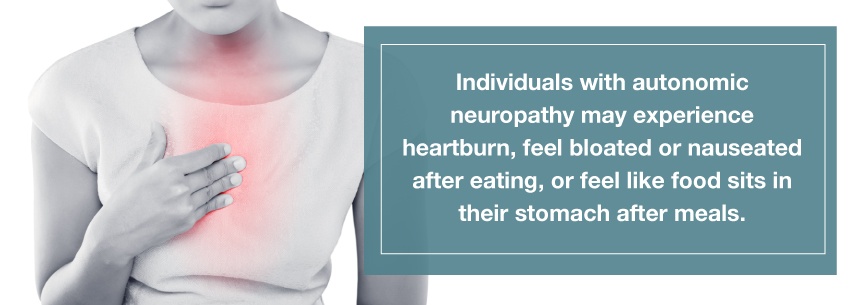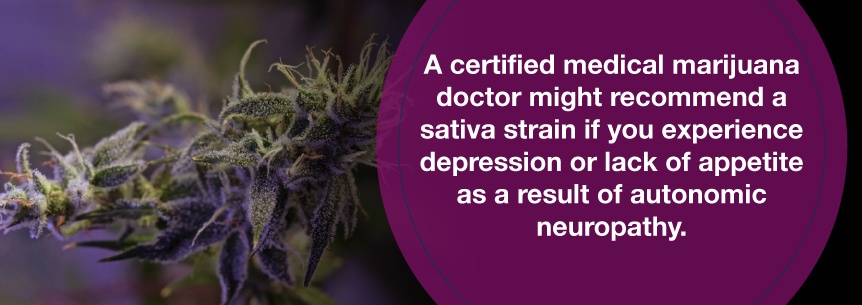Autonomic neuropathy is not a disease. Instead, autonomic neuropathy describes a group of symptoms which may be caused by an underlying condition.
Also known as autonomic dysfunction, autonomic neuropathy occurs as a result of nerve damage. The damaged nerves interfere with the messages sent between the brain and the autonomic nervous system (ANS), causing the ANS not to work. The ANS controls involuntary body functions such as heartbeat, digestion, breathing, sweating, blood pressure regulation and more. Autonomic neuropathy may be caused by a disease, or it could be a side effect of certain medications. Sometimes, there is no known cause.
Diabetes is the most common cause of autonomic neuropathy. Diabetic autonomic neuropathy (DAN) is common for individuals with Type 1 and Type 2 diabetes. According to a 2017 report released by the Centers for Disease Control and Prevention (CDC), 30.3 million Americans, or 9.4 percent of the population, have diabetes.
Numerous studies support medical marijuana as an effective treatment for a vast array of conditions, including disorders that might cause autonomic neuropathy. Medical cannabis may also be used to relieve the symptoms of autonomic neuropathy. Lastly, cannabis may promote nerve regrowth or repair. In this article, we will explore autonomic neuropathy and how cannabis can help millions of people cope with the discomfort and sometimes terrifying symptoms resulting from nerve damage.
Symptoms vary between individuals with autonomic neuropathy, as they depend on which nerves are affected. Symptoms may include one or more of the following:

There are many different causes of autonomic neuropathy. Autonomic neuropathy may be a side effect of treatment for a disease, or it can be a complication of the following conditions:
There is no treatment available for autonomic neuropathy. Instead, individuals experiencing autonomic neuropathy should focus on symptom management and treat the underlying cause. For example, if a diabetic patient has autonomic neuropathy symptoms, they might focus on controlling their blood sugar. By treating the underlying cause of autonomic neuropathy, patients may be able to repair damaged nerves.

However, sometimes doctors cannot identify an underlying cause of autonomic neuropathy. In either case, patients can manage symptoms and make healthy lifestyle choices. Treatment depends on the affected nerves and body areas.
Patients with autonomic neuropathy focus on managing symptoms in the following ways:
Treatment side effects vary greatly and depend on the condition being treated and the medications used to manage autonomic neuropathy symptoms. While a healthy diet and exercise routine usually make a positive impact on most individuals, certain medications pose the risk of side effects.
For example, a doctor may recommend fludrocortisone to help a patient retain salt and regulate blood pressure. Some side effects of fludrocortisone may include:
If a patient with autonomic neuropathy suffers from constipation, they may use laxatives to treat their symptoms. Laxatives carry the following possible side effects:
With laxatives, serious side effects are rare, and they usually go away once you stop taking a laxative. However, it is always worth considering the possibilities.
Many other treatment side effects exist depending on the medications used to treat underlying conditions.
Medical cannabis has been shown to effectively treat numerous conditions, including disorders that cause autonomic neuropathy. Likewise, studies show that marijuana has regenerative properties, helping to restore and repair damaged nerve cells. Finally, marijuana may slow neurodegeneration in nerve disorders.
Although there is no exact medical marijuana treatment for autonomic neuropathy to date, scientists are opening the doors to treatment possibilities as the following studies show. Also, it is known that medical cannabis can relieve many symptoms, such as those experienced with autonomic neuropathy.
A study published in 2013 looked at the effects of herbs as treatment for patients with chemotherapy-induced neuropathy (CIPN). CIPN involves damage to the peripheral nervous system and drastically reduces a patient’s quality of life. It is a side effect of several neurotoxic chemotherapeutic drugs.
In this study, cannabis sativa was tested in a rat model. Researchers suggested that CB2 cannabinoid receptors may be “important therapeutic targets for the treatment of chemotherapy-evoked neuropathy.” This study points out that cannabis has had positive effects on neuropathic pain in multiple clinical trials.
A 2015 university article identifies the cannabinoid system as a “key player” in adult neurogenesis. The cannabinoid receptors CB1 and CB2 are expressed throughout the central nervous system. According to this article, evidence suggests that cannabinoids can control cell genesis in the adult brain depending on dose and duration of administration as well as the cannabinoid used. For example, a study that administered cannabidiol (CBD) to mice found an increase in net neurogenesis.
Despite the evidence, much is yet to be understood about the process of neurogenesis. Scientists are especially interested in studying the effects of cannabinoids on neurogenesis, suggesting that medications which target the endocannabinoid system may help regulate complex systems.
Marijuana may be used as an effective treatment for disorders that cause autonomic neuropathy, such as diabetes. For example, a study published by the American Diabetes Association (ADA) looked at the effect of CBD and tetrahydrocannabivarin (THCV) in patients with Type 2 diabetes. They found that THCV decreased fasting blood glucose, or blood sugar, and improved pancreatic function. They concluded that THCV could potentially be a new therapeutic agent in glycemic control in patients with Type 2 diabetes.
Another study from 2015 examined the effects of cannabis on painful diabetic neuropathy. In the study, 16 patients with diabetic peripheral neuropathy inhaled cannabis and placebos in various doses. The study demonstrated a reduction in diabetic peripheral neuropathy pain in patients where other treatments did not work.
Marijuana may prevent diabetes according to a study published in the American Journal of Medicine in 2013. This study found that current marijuana use was associated with 16 percent lower fasting insulin levels. They also concluded that marijuana use was associated with smaller waist circumference.

According to the Mayo Clinic, studies show that medical cannabis helps with multiple sclerosis (MS) symptoms — another possible cause of autonomic neuropathy. Cannabis can help relieve muscle stiffness and spasms, as well as bladder urgency associated with MS.
Marijuana may also be used to treat other conditions such as:
Fortunately, researchers, scientists and doctors are beginning to take medical marijuana more seriously now that it is legal in most states. Medical cannabis as a treatment for autonomic neuropathy could be established sometime shortly.
Although more research needs to be done to discover how cannabis can treat conditions underlying autonomic neuropathy, plenty of information is known about marijuana and its effect on the human body.
Medical marijuana helps our natural endocannabinoid system regulate inflammation, control pain and impact other common symptoms resulting from an array of disorders. Marijuana can reduce autonomic neuropathy symptoms by:
Marijuana plant has two main types of strains used for medicinal purposes — indica and sativa. Legally, indica and sativa are the same. Medically, they both serve a different purpose as they have unique effects and healing properties.

The type of strain you use for autonomic dysfunction depends on your symptoms. A certified medical marijuana doctor might recommend a sativa strain if you experience depression or lack of appetite as a result of autonomic neuropathy. Sativa strains are generally more energizing than indica strains and have the following effects:
On the other hand, if autonomic neuropathy symptoms include pain, anxiety or nausea, your doctor might recommend an indica strain. Indica strains are typically calming and have the following effects:
Like sativa strains, indica can also be used to increase appetite. Speak with a certified medical marijuana doctor or dispensary associate to discuss the best strain for your symptoms.
There are many different methods of ingesting medical marijuana. A qualified physician will consider your current health condition, the desired effects and your lifestyle to help you choose the best method. Ultimately, it is up to you and what you are most comfortable.
Medical marijuana patients commonly consume cannabis using the following methods:
Patients may also take medical marijuana in the form or capsules, suppositories or drinks. Smoking is the most widely known method for consuming marijuana and acts fast to relieve nausea and other symptoms. However, smoking is not recommended because it may irritate the lungs or throat.
Just like any medication, medical marijuana may have certain side effects and will affect each person differently. However, cannabis usually produces milder and more manageable side effects than other prescription medications. Unlike certain prescription medications, you cannot overdose on medical cannabis.
Potential side effects of medical marijuana include:
Some individuals may not experience any side effects. Overall, individual reactions largely depend on factors such as dosage amount, strain, time of day used and the method of administration. Always follow the doctor’s recommendations.
Patients suffering from autonomic neuropathy may experience a variety of symptoms on a regular basis. Studies suggest that medical marijuana may help repair nerve damage and soothe associated symptoms. It is known that cannabis effectively treats many conditions which cause autonomic neuropathy, as well as ease the side effects of disease treatments such as chemotherapy.
If you suffer from a condition which causes autonomic neuropathy and would like to learn more about medical marijuana treatment, use our database to search for a cannabis-certified doctor or dispensary today. To stay informed about the latest medical marijuana news and research, sign up for our free monthly newsletter.
Find A Doctor Find A Dispensary


Please allow us to access your location to find local dispensaries.
VIEW ALL DISPENSARIES ➔